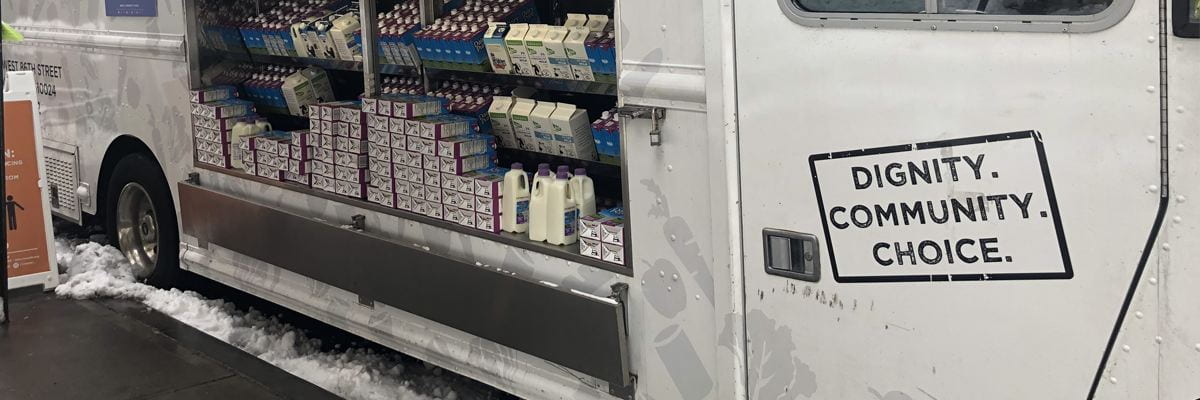When Covid-19 hit New York, US, in 2020, Chef Greg Silverman (Food & Nutrition Policy, 2011) was already providing food to 12 000 families in the city through West Side Campaign Against Hunger. As the pandemic took hold and it became clear how many needed their help, they made innovative changes to provide good quality food and services to all.
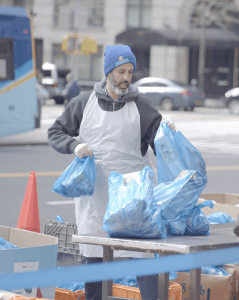 Dignity. Community. Choice. The values behind those words underpin the work West Side Campaign Against Hunger (WSCAH) does with City alumnus Greg Silverman as CEO. Fighting food insecurity in New York, they offer a supermarket-style food pantry where those who need free healthy food can make their own choices for their families. They also provide support with social services, taxes, and cooking and nutrition. When Greg came onboard, his view that all humans should have a right to the same level of food and services, pushed the charity even further.
Dignity. Community. Choice. The values behind those words underpin the work West Side Campaign Against Hunger (WSCAH) does with City alumnus Greg Silverman as CEO. Fighting food insecurity in New York, they offer a supermarket-style food pantry where those who need free healthy food can make their own choices for their families. They also provide support with social services, taxes, and cooking and nutrition. When Greg came onboard, his view that all humans should have a right to the same level of food and services, pushed the charity even further.
“People travelled from all across New York City to our pantry, because they know they can get fresh chickens, fresh fish, alternative dairy, and amazing fresh produce. And we were saying, let’s bring it to people,” Greg says and explains that before Covid-19 was on anyone’s mind, his team introduced a mobile grocery truck to bring food to 15 different locations across NYC or easier access.
“If you have money, you get food to your door. Why don’t people in poverty have the same options? It seems an absurdity. Just because you have money, you get a better service?”
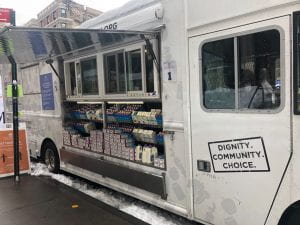 At the start of the Covid-19 pandemic, New York was hit hard, and many of Greg’s customers were hit the hardest. Although WSCAH had to close the physical doors to their main pantry on 86th Street, they immediately came up with new ways of supplying their customers with the same healthy foods.
At the start of the Covid-19 pandemic, New York was hit hard, and many of Greg’s customers were hit the hardest. Although WSCAH had to close the physical doors to their main pantry on 86th Street, they immediately came up with new ways of supplying their customers with the same healthy foods.
“Within four hours, we rented two trucks and moved 10,000 kilos of food up into the trucks, grabbed our laptops, grabbed, you know, everything we thought we would need. We didn’t know for how long. And we started distributing food on the street, and social services virtually. We never missed a day. We still haven’t,” Greg says.
They quickly grew to 60 partners across all five boroughs of New York to whom they distributed food.
Although there was now easier access to food in the streets, it soon became clear there were still those who couldn’t access it due to the pandemic.
“We talked to Bellevue Hospital and they were like we can’t send people home after they’ve had Covid without food. We have a lot of people who are food insecure and are in poverty. They’re going to have to quarantine once they get home. We need to send them home with food. We just don’t know how to do it,” Greg says. “We called every single one of those seniors and said, “Do you want us to deliver food to your home?” And they were like, “Yes, please”. And that’s when we signed up with all these different third-party delivery vendors who deliver food from restaurants, and we just started delivering food.”
The involvement of delivery drivers highlighted the level of food insecurity that exists in New York.
“Shockingly, most of these drivers are in poverty”, Greg explains.
“They wanted access to benefits. They wanted food. I mean, we’d be out on the street, and subway drivers and bus drivers would be stopping and coming out and getting food from us. Because the essential personnel who were still working in person during the beginning of the pandemic, grocery store workers, nursing home aides, delivery drivers, etc., are all people living on poverty wages, right? And they were all getting food and became a huge number of customers.”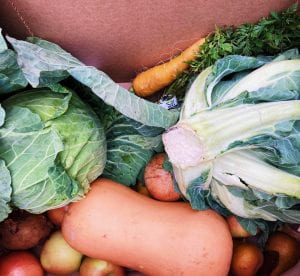
West Side Campaign Against Hunger receives some of its funding from the city and state, but mostly via private donations, but during the pandemic there was a massive increase in federal support, especially in the shape of food.
“We were getting about 15,000 kilos of food, fresh produce a week, through the federal government. Like literally a full 18-Wheeler tractor-trailer was showing up every week”, Greg says. “All this food coming through to us for free was because the Government was paying farmers to stay in business, which was super important, to help maintain the supply chain. It helped so many of our customers get amazing produce.”
All of WSCAH’s customers get screened before they get access to food in order to help enrol them for benefits such as Food Stamps, Health Insurance, Housing supports, etc and as a safe and confidential partner, all their information remains safe. Greg thinks that’s extremely important for those who fear the federal government, and why he refused to increase documentation when their support arrived. “Seventy percent of my customers are Latinx, and we have lots of families who are undocumented or in mixed immigration status households, so we were like, no, we’re not signing anything.”
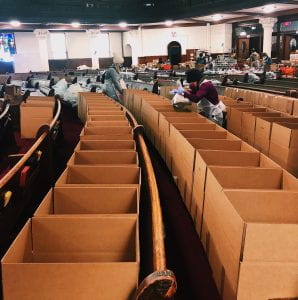 To Greg Silverman, it wasn’t just important to protect his customers though.
To Greg Silverman, it wasn’t just important to protect his customers though.
“We realised we had to really take care of our staff in a way that maybe is unheard of in the US. For every staff member who was working on the frontline, they got additional hazard pay for every hour. We already paid 100% health insurance for everyone who worked for us and their entire family. We made sure everyone had all the equipment they needed. We sent everyone home with a box of sanitizer and masks and gloves and everything their families wanted and needed.”
On top of all that WSCAH, halfway through the pandemic, due to his 28 member staff’s incredible dedication and efforts, they gave every staff member a month’s paid bonus!
Financial support has been important but so has mental health support.
“We’ve done trauma workshops and individual sessions for people. They were on the street in March, April, May when no one knew what was happening, right?”
Despite the anxiety, the vast majority stepped up, sometimes putting themselves in danger.
“We were doing an emergency delivery of 200 boxes of food on the Upper West Side and one of our staff members who delivered the food turned around, heard what he thought was construction noise, something like a hammer, walked out in the street, and was shot in the shoulder,” Greg recalls with emotion. “We thought we’d got through six months of a pandemic and then one of our staff members was being taken away in an ambulance and was in the hospital for 10 days.”
The member of staff is still recuperating but hopes to be back in the near future.
“No one thought, you know … No one thinks when they go to work to feed the community that their job is going to be to take a bullet,” Greg says.
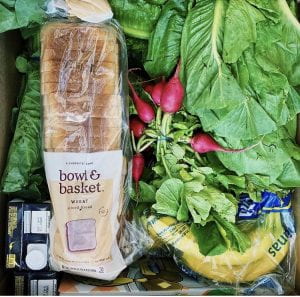 Although the past year has delivered a lot of challenges, Greg sees a silver lining in the added donations they’ve received from all stakeholders, and innovations it’s spurred WSCAH to do.
Although the past year has delivered a lot of challenges, Greg sees a silver lining in the added donations they’ve received from all stakeholders, and innovations it’s spurred WSCAH to do.
“We raised over 2 million dollars to build, pilot, and evaluate an open source food delivery app for customers, so that we can make sure that even after the pandemic, customers can get a choice of healthy food delivered to their community and to their door.”
New policies are also being considered in the US. “I think there are policies that were tested out during Covid that are becoming embedded into federal policy because it’s been proven that they work already. And I think that’s very powerful,” Greg says.
And even when policies fail, he knows there are good people willing to help.
“Every day we support and are supported by thousands of community members. What we know is fact is that no one wants to live in poverty. It’s that simple. And people who are in poverty, want to help other people all the time. All the time. I think that’s the key thing. Even in the darkest moments of this pandemic, folks are constantly wanting to give back. And I think that’s the bigger hopeful picture I can hang my hat on.”
A big thank you to Greg Silverman for sharing his and West Side Campaign Against Hunger’s story, and for the great work they do.
![]()
CEO and Chef Greg Silverman (Food & Nutrition Policy, 2011) was the owner of three restaurants and already focused on better quality food than the standard food system provided, before attending City, University of London.
“I wanted to get the academic underpinnings I needed to create change.”
Having read up on the course in food and nutrition policy, and its academic staff, he knew it was the right fit for him.
“As someone who knew we were going back to the US at some point, I actually didn’t want a US-centric viewpoint, because I knew that the US is far behind in how it thinks about the food system. So, it was really helpful to go to City University and be pushed on ideas and think of them often from a UK, EU, or global perspective.”
Greg feels the course set him up for his return to the US, and his commitment to food quality and equality.
“I was really able to use everything I learned at City University. Some may have thought I was super smart, but it was just that I had the academic and intellectual underpinnings gained while at City,” Greg says.
Before his role leading WSCAH, Greg worked in Washington, leading nutrition education for Share Our Strength, a national anti-hunger charity. He was in charge of growing the engagement across the nation and also leading White House nutrition engagement via Former first Lady Michelle Obama, and the Let’s Move campaign.
Greg has worked at West Side Campaign Against Hunger since 2016, as Executive Director and now CEO. ![]()
